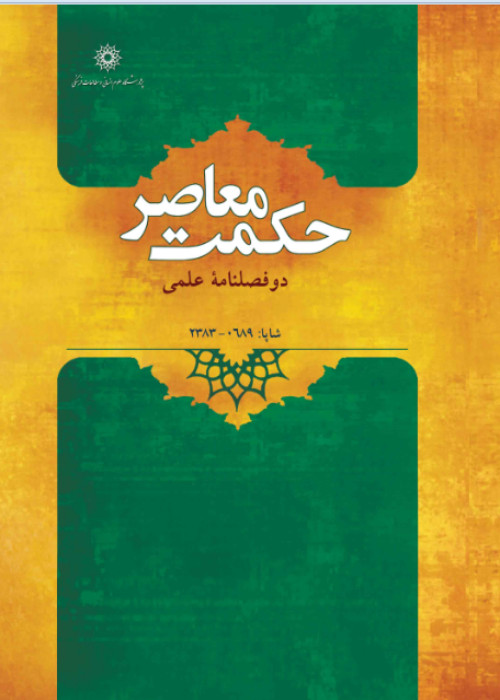Two Kinds of Philosophizing with Respect to Philosophy’s Past
Willard Van Orman Quine, one of the dominant figures in the 20th-century Anglo-American philosophy, is said to have joked that “there are two sorts of people interested in philosophy, those interested in philosophy and those interested in the history of philosophy”. Quine seems to suggest, in a humorous manner, that the history of philosophy lies completely out of the realm of real philosophy. If taken seriously, philosophy would have nothing to do with the history of philosophy. I argue in this article that Professor Quine and others of his mindset are wrong in that they mix up things that should be discriminated.As is well known, attitudes toward philosophy may be categorized in a variety of ways, among them is the familiar division of schools of “Analytic” and “Continental” in the Western philosophy, and the schools of “Peripatetic”, “Illuminationist” and “Transcendental” in the Islamic tradition of philosophy. In the same line of drawing contrast between different modes of philosophical thought and according to their relation with the history of the enterprise of philosophy, this article differentiates between two kinds of philosophizing, namely “trendy” and “historical”.Those loyal to the trendy way of philosophizing see their professional practice as independent from philosophy’s past, and rely solely on the ability of their “presentist” reason to address the currently existing challenges. This may be called a memoryless way of philosophizing, as there would be no need from this outlook to be concerned with philosophy’s past or to keep a memory of what has already happened in the enterprise. Philosophy as expected to be practiced now may be said to be detached from philosophy’s past, just as is the case in sciences. Those people who may be interested in the historical issues may of course refer to the history of philosophy, but this would not be philosophy proper. One could regard the contemporary Analytic philosophy which is the mainstream in Anglo-American circles as an exemplar of this attitude, whose pioneers give a demeaning look at the history of philosophy. As Wittgenstein has put in his Tractatus Logico-Philosophicus, “most of the propositions and questions to be found in philosophical works are not false but nonsensical.” If this is the case, why should philosophers bother themselves with the history of philosophy at all?Adherents of the historical way of philosophizing, on contrary, turn to philosophy’s past seeking philosophical truth, and shape their philosophy in exchange with it. According to this outlook, history of philosophy is like a precious mine of problems and ideas that were explored partially by some brilliant minds in the past. We may take benefit of their efforts by taking their philosophical concerns serious and move forward the enterprise by engaging with their problems and ideas. Many updates from different aspects would be needed for sure, but the essence of philosophical problems remains the same through the history of ideas. We would therefore need to do philosophy historically, that is to master the past as the key to understand the present. This type of philosophizing seems to have been realized by Islamic philosophers, who typically position themselves within a lineage of preceding thinkers. Just take the example of Mulla Sadra’s Asfar, a masterpiece in transcendental school of Islamic philosophy, and see the vast amount of discussions devoted to the thought of past thinkers.The way of philosophizing adopted by the advocates of each camp would have crucial impacts on their philosophy’s pedagogy and writing style, as well as on their historiography of philosophy. Especially, both are very susceptible to historical anachronism, namely to shape a distorted narrative of the past as viewed from the supposed vantage point of the present. Moreover, each attitude has also its peculiar characteristics. On one hand we see that the writings of trendy philosophers are typically overwhelmed with philosophical jargon; i.e., expressions that have gained very specialist and narrow meanings. On the other hand, the relations of ideas explored by historical philosophers and their development over centuries are usually very complicated to be captured, so the need for long years, even decades, for a scholar to be able to enter the circle of interlocutors.The present article characterizes trendy and historical ways of philosophizing separately, details their implications, and finally put them in comparison against each other. This problem falls within the scope of what is usually called metaphilosophy, and would make salient some features in the enterprise of philosophy that otherwise would have remained obscure. Another metaphilosophical issue is the probable unnoticed effects of the history of philosophy on the work of philosophers, whether trendies or historicals. This issue remains to be investigated further in a subsequent research.
- حق عضویت دریافتی صرف حمایت از نشریات عضو و نگهداری، تکمیل و توسعه مگیران میشود.
- پرداخت حق اشتراک و دانلود مقالات اجازه بازنشر آن در سایر رسانههای چاپی و دیجیتال را به کاربر نمیدهد.


